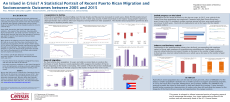An Island in Crisis? A Statistical Portrait of Recent Puerto Rican Migration and Socioeconomic Outcomes between 2005 and 2015
An Island in Crisis? A Statistical Portrait of Recent Puerto Rican Migration and Socioeconomic Outcomes between 2005 and 2015
Introduction
Puerto Rico’s economic decline has become widespread news in recent years. While Puerto Rico is often considered culturally and linguistically distinct from the United States, its political and economic relationship with the United States has shaped Puerto Rican migration patterns since its colonial days.
Since 2006, Puerto Rico has faced multiple economic setbacks –the repeal of tax incentives, mounting debt, high unemployment, and weak economic institutions. The decade-long recession has led to the migration of working-age adults in search of job opportunities and better economic conditions.
Many point to the phasing out and of Section 936 of the IRS code as an event that may have contributed to the recent large out-migration of Puerto Ricans (Abel & Dietz, 2014). Section 936 helped bolster manufacturing activities through tax exemptions. The program expired in 2005. However, in 2010, the Puerto Rican government enacted the Tourism Development Act to facilitate and promote tourism projects and businesses.




